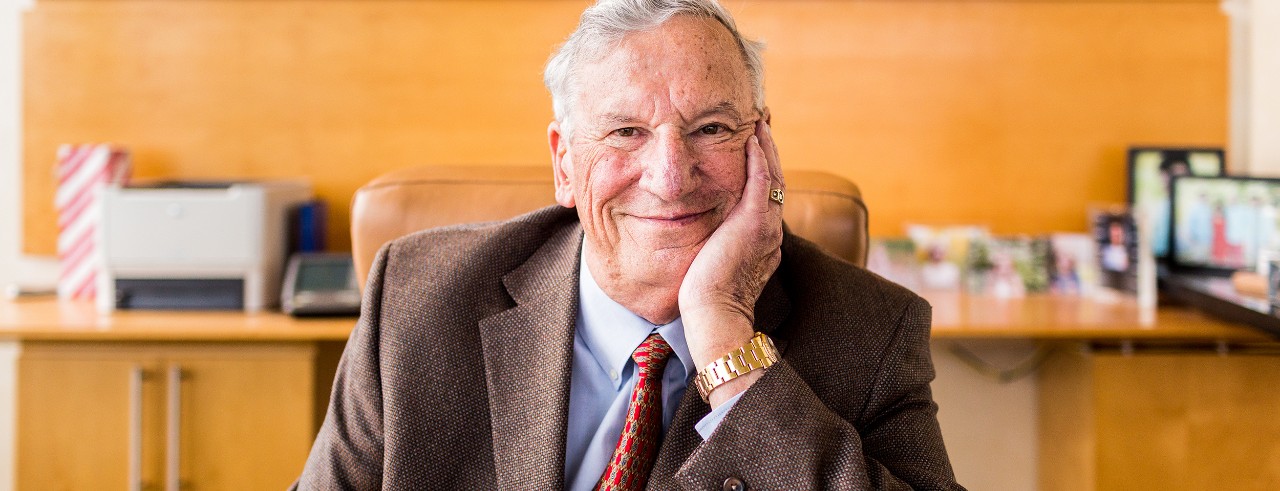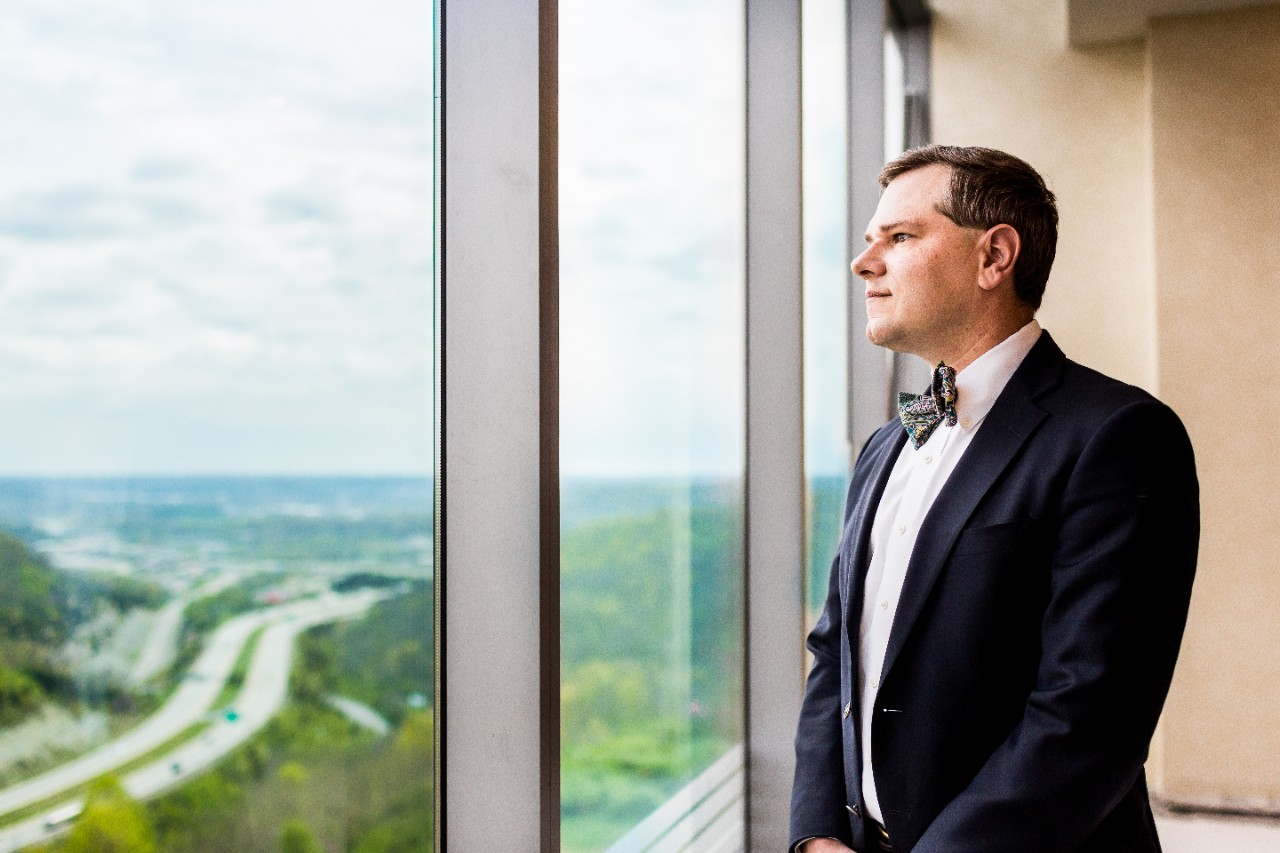
$2.1 million gift drives multidisciplinary collaboration
Donation from alumnus allows two colleges to treat anxiety and depression
By Harper Lee
University of Cincinnati alumnus Bill Yung wanted to help ensure that future patients suffering from anxiety and depression did not endure what he did: weeks of testing medications, searching for the right fit.
“When you have an illness and you suffer through it, you want to — if you can — find things that will alleviate it for other people,” Yung said. “The idea of taking a medicine for two weeks, three weeks — and then that one doesn’t work and then start over for another two or three weeks while you’re really suffering — is something that would be nice to avoid.”
Armed with this knowledge and his own experience, Yung turned to his alma mater. He engaged fellow Bearcat Dr. Jeffrey Strawn, a national expert in the treatment of anxiety and depressive disorders and an associate professor of psychiatry and behavioral neuroscience at the UC College of Medicine. Together, the two decided to tackle the “one-size-fits-all” approach to selecting medication treatments in psychiatry.
With a $2.1 million gift from his family’s foundation, Yung is supporting Strawn’s research on using precision medicine approaches to treat anxiety and depressive disorders.
Strawn and his team plan to conduct three related studies at UC. Two clinical trials will look at treatment responses in patients. A third large-scale study will leverage data from the National Institutes of Health to identify which patients respond best to treatments.
“The two clinical studies focus on predicting outcomes prior to initiating treatment, as opposed to the prevailing current approach, waiting for improvement to occur over time,” Strawn said. “Unfortunately, during that waiting period, patients continue to experience depression and anxiety. They may not be working. They may be struggling in relationships. They continue to suffer and, unfortunately, that’s for a treatment that ultimately may not work.”
Anxiety and depressive disorders are the most common mental health conditions in the United States. Ranking among the top causes of disability globally and affecting up to 15 percent of individuals, anxiety and depressive disorders take an immense toll on patients, families and the health care system. Experts say that more than 16 million Americans will experience at least one episode of major depression in their lifetime. Depressive and anxiety disorder create an economic burden of approximately $200 billion per year.
“Much research in psychiatry and in medicine has the potential to change treatment approaches 10 to 20 years down the road,” Strawn said. “Bill was interested in research that would be translatable to the clinic immediately. … So for me, one of the most exciting promises of these projects is that we can quickly bring the results to the clinic and to our patients.”
It’s hard to explain what depression is unless somebody’s been through it. But I wanted to help. I’m able to help. So, I wanted to help with something that would make depression less painful for people.
Bill Yung, UC alumnus
Both Yung and Strawn are delighted that this groundbreaking research is happening at their alma mater. Because of UC, Strawn says he can assemble an elite, multidisciplinary team to collaborate on this complex research, across colleges.
A key member of Strawn’s research team, Jeffrey Mills, Ph.D., agrees. Mills is an associate professor of economics at UC’s Carl H. Lindner College of Business and brings his expertise in creating models of treatment response and statistics.
Using cutting-edge statistical methods, Mills will identify patterns and trends in how patients respond to specific treatments. These insights will help physicians better predict what treatment might work best for an individual patient and how quickly.
“The precision approach is really about identifying predictors,” Mills said. “If someone comes into the clinic, can we figure out before we give them any medicine which medicine is going to work best and how well it’s going to work? It’s about identifying which variables best predict outcomes. That’s what we do in economics all the time.”
Mills said that the opportunity to change people’s lives for the better is inspiring.
“The great thing about this type of research is that the impact is direct,” Mills said. “You publish in a good journal. The clinicians read it and are able to start applying your findings. It actually changes people’s behavior in terms of medical practice very quickly. And, you really feel it — ‘This is important!’”

Jeffrey Strawn, MD, is a national expert in the treatment of anxiety and depressive disorders and an associate professor of psychiatry and behavioral neuroscience at the UC College of Medicine.
Marianne Lewis, Ph.D., dean at the Carl H. Lindner College of Business is also excited by what the collaboration between Strawn and Mills will yield.
“Research impact is most powerful at the intersections — across fields, between theory and practice, beyond silos,” Lewis said. “The collaboration between Strawn in his innovative medical studies and Mills with his predictive analysis expertise will yield rigorous, actionable insights that can make a difference. They set a great example for the university overall.”
While current standard treatments are ineffective for a number of patients, Strawn said, a precision-medicine approach to treat anxiety and depressive disorders could alleviate needless suffering, said Dr. Andrew Filak, interim senior vice president for health affairs and dean of the UC College of Medicine.
“Collaborative research gets to the heart of innovation,” Filak said. “As physicians, we are always asking ourselves: what else can we do for patients? How else can we help and heal? By joining their different fields, Dr. Strawn and Dr. Mills are together opening the door to a brighter future for the millions of people suffering from anxiety and depressive disorders.”
And for Yung, supporting Strawn’s research is a way to transform his experience into an opportunity to improve the lives of others through philanthropy.
“It’s hard to explain what depression is unless somebody’s been through it,” Yung said. “But I wanted to help. I’m able to help. So, I wanted to help with something that would make depression less painful for people.”
Featured image at top: Bill Yung. Photo/Jacyln Poeschl/UC Foundation
Make your impact, your way
The UC Foundation can help you explore how to make your gift have the greatest impact on campus and throughout our community. Read about the options or call 513-556-6781.
Related Stories
It’s a mindset: Meet the visionaries redefining innovation at...
December 20, 2024
Innovation is being redefined by enterprising individuals at UC’s 1819 Innovation Hub. Meet the forward thinkers crafting the future of innovation from the heart of Cincinnati.
UC students well represented in this year’s Inno Under 25 class
December 20, 2024
Entrepreneurialism runs through the veins of University of Cincinnati students, as confirmed by the school’s strong representation in this year’s Inno Under 25 class.
UC professor Ephraim Gutmark elected to National Academy of...
December 20, 2024
Ephraim Gutmark, distinguished professor of aerospace engineering at the University of Cincinnati, was elected to the 2024 class of the prestigious National Academy of Inventors.
